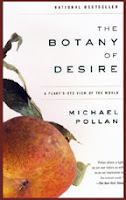A Plant\’s-Eye View of the World
by Michael Pollan
 Speaking of plants as having consciousness really stretches the imagination. I think Pollan carries his metaphors in The Botany of Desire a bit too far. And he talked about Apollo and Dionysus way too much. But overall, this book about how four common plants evolved traits that gratify the human senses- sweetness for the apple, beauty for the tulip, intoxication for the cannabis and what? control for the potato? he kinda lost me there- is pretty interesting and taught me quite a number of things. I learned about the Irish potato famine, and how organic potato growers differ from commercial ones. I learned that modern apple trees are all clones (pretty bad for genetic diversity- see Where Late the Sweet Birds Sang for an idea of what cloning might do to humans). The chapter about marijuana was rather confusing and really began to loose my attention- the only frame of reference I have for that plant is a sickly sweet smell in high school bathrooms and more recently, watching episodes of Weeds. And having read Confessions of an Ugly Stepsister not very long ago, a book which places the Cinderella story in the middle of the 1600\’s Dutch tulip craze, I appreciated learning more details about that phenomenon. One little paragraph particularly caught my attention, where Pollan briefly mentions \”one theory of the origins of agriculture [which] holds that domesticated plants first emerged on dump heaps\”. A few years ago I read in a book called Dogs: A Startling New Understanding of Canine Origin, Behavior, and Evolution by Raymond Coppinger of the idea that domestic dogs are descended from wolves that were attracted to rubbish heaps- who began the taming process themselves, in a way. It was curious to think that domestic plants may have also had roots in our anciently discarded trash. But rubbish this book is not. It was entertaining, if a bit tedious, confusing and contradictory at times. Not terribly scientific, but for someone like me who doesn\’t know much about the natural history of plants, quite readable and very interesting.
Speaking of plants as having consciousness really stretches the imagination. I think Pollan carries his metaphors in The Botany of Desire a bit too far. And he talked about Apollo and Dionysus way too much. But overall, this book about how four common plants evolved traits that gratify the human senses- sweetness for the apple, beauty for the tulip, intoxication for the cannabis and what? control for the potato? he kinda lost me there- is pretty interesting and taught me quite a number of things. I learned about the Irish potato famine, and how organic potato growers differ from commercial ones. I learned that modern apple trees are all clones (pretty bad for genetic diversity- see Where Late the Sweet Birds Sang for an idea of what cloning might do to humans). The chapter about marijuana was rather confusing and really began to loose my attention- the only frame of reference I have for that plant is a sickly sweet smell in high school bathrooms and more recently, watching episodes of Weeds. And having read Confessions of an Ugly Stepsister not very long ago, a book which places the Cinderella story in the middle of the 1600\’s Dutch tulip craze, I appreciated learning more details about that phenomenon. One little paragraph particularly caught my attention, where Pollan briefly mentions \”one theory of the origins of agriculture [which] holds that domesticated plants first emerged on dump heaps\”. A few years ago I read in a book called Dogs: A Startling New Understanding of Canine Origin, Behavior, and Evolution by Raymond Coppinger of the idea that domestic dogs are descended from wolves that were attracted to rubbish heaps- who began the taming process themselves, in a way. It was curious to think that domestic plants may have also had roots in our anciently discarded trash. But rubbish this book is not. It was entertaining, if a bit tedious, confusing and contradictory at times. Not terribly scientific, but for someone like me who doesn\’t know much about the natural history of plants, quite readable and very interesting.
Rating: 4/5 271 pages, 2001


One Response
Wow–this one seems a little bizarre, but interesting.